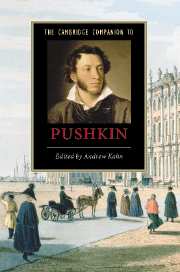Book contents
- Frontmatter
- Introduction
- Part I Texts and Contexts
- Part II The Pushkinian tradition
- 11 Pushkin in music
- 12 Pushkin and Russia Abroad
- 13 Pushkin filmed: life stories, literary works and variations on the myth
- 14 Pushkin in Soviet and post-Soviet culture
- Appendix on verse-forms
- Guide to further reading
- Index
14 - Pushkin in Soviet and post-Soviet culture
from Part II - The Pushkinian tradition
Published online by Cambridge University Press: 28 March 2007
- Frontmatter
- Introduction
- Part I Texts and Contexts
- Part II The Pushkinian tradition
- 11 Pushkin in music
- 12 Pushkin and Russia Abroad
- 13 Pushkin filmed: life stories, literary works and variations on the myth
- 14 Pushkin in Soviet and post-Soviet culture
- Appendix on verse-forms
- Guide to further reading
- Index
Summary
Pushkin’s unique place in the Russian national consciousness owes less to his greatness as a poet than to the fact that a myth of Pushkin lies at the heart of the Russian national identity which is defined by a conflict between a lofty image of Russia’s majesty, and the bleakness of her past and uncertainty of the present. It can be described as a cross between an inferiority complex and a superiority complex. Russianness is realised in a dichotomy that was engendered by Pushkin. It was he who created that Russia which, in the words of the nineteenth-century poet Fedor Tiutchev, 'the mind cannot grasp' by creating an enchanting fairytale about this huge, cold, bleak and cruel land. Pushkin made possible Turgenev’s young noblewomen, Tolstoy’s noble heroes, Chekhov’s good-natured protagonists, Bunin’s dark alleys and Blok’s beautiful stranger, the captivating music of Tchaikovsky and Rachmaninov, the painter Isaac Levitan’s melancholy canvases and Diaghilev’s exquisite ballets. That is why Pushkin is of such vital importance to Russians, and why his status in Russia is so hard for foreigners to fathom.
The one writer who falls out of this magical list is Dostoevsky. It is no coincidence that he was the first to articulate the idea of Russia’s messianic role using the image of Pushkin, for he found himself at the heart of the Pushkin myth. Dostoevsky was the first to reveal the depth of the national trauma. Dostoevsky is Pushkin in reverse. He is the inner side of Russian national identity, whilst Pushkin is its radiant exterior. Maxim Gorky (1868-1936), the founding father of Soviet literature, understood this only too well.
- Type
- Chapter
- Information
- The Cambridge Companion to Pushkin , pp. 202 - 220Publisher: Cambridge University PressPrint publication year: 2006
- 1
- Cited by

